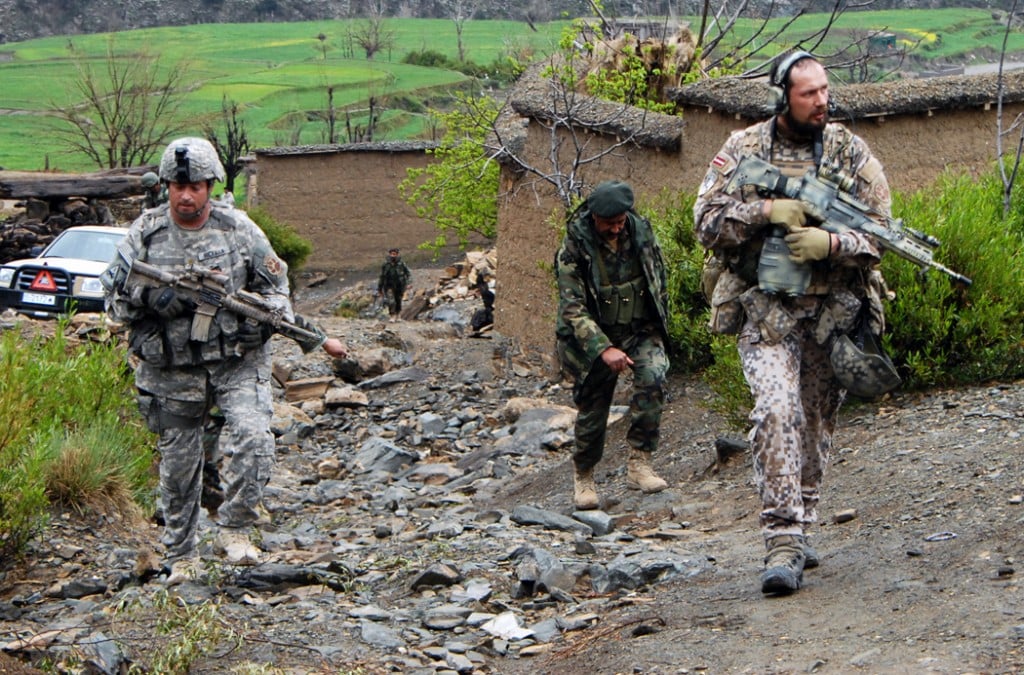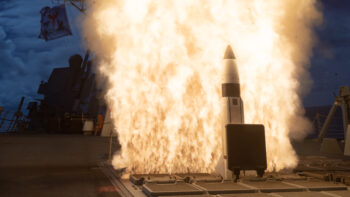
A Latvian special operator patrols in Afghanistan alongside a US and an Afghan soldier.
LATVIAN EMBASSY, WASHINGTON: “We are neighbors of Russia and we have always been realists,” Ambassador Andris Razans told me. “Sometimes we might be characterized as alarmists, troublemakers, etc., but I think we are realists.”
Even as President Obama exchanges tense words with Vladimir Putin on the sidelines of today’s D-Day anniversary ceremony, many Americans and Western Europeans still look at Russian aggression in Ukraine with bafflement and ask “how can this be happening?” For many in the smaller eastern nations with long memories of living in Moscow’s shadow, the response is more like “we told you so.”
The Latvian ambassador to Washington was too, well, diplomatic to say this out loud, but then he hardly had to: For our interview, he sat directly under the photos of his predecessors — many of whom represented the government-in-exile that kept the embassy open during the Soviet occupation of the Baltic States, 1940-1991.
“This is a very vivid memory,” Amb. Razans told me. For older Latvians in particular, the Russian annexation of Crimea triggers flashbacks to the Soviet takeover of their own country 74 years ago. At the same time, “it has been a very different kind of warfare, [including] the unfolding propaganda campaign that we are facing in Europe,” he warned. “The question is whether NATO is really up to the task to address all aspects of this warfare.”
Yes, Russia has finally pulled back significant ground forces from the Ukrainian border, the ambassador acknowledged, but Moscow has other means besides conventional military power. “You might be moving your troops away,” Razans said, “but on the other hand if you continues to support activities that … keep the situation unstable, I think we stand very far away from ‘backing off.'”
That’s where Russia’s cyber and information warfare capabilities come in.
An Invisible Red Army
Putin has one asset that Stalin didn’t: cyberspace. “Russia is much more powerful and more skillful in the cyber arena than we know here in the western world,” said Jarno Limnell, a former Finnish military officer who’s now director of cybersecurity for Intel Security (formerly the independent firm McAfee). While their campaign against Ukraine has kept a lower profile than the so-called “cyber war” against Estonia (Latvia’s neighbor) in 2007, they’ve been “much more active” that most people realize, Limnell told me over coffee during a recent visit to Washington.
Consider the “Snake” spyware program found a few months ago in Ukrainian government systems. According to a BAE study, Snake, aka “Turla,” has hit Ukraine more than any other country, with attacks increasing 14-fold since 2010. (Incidentally, the second most-targeted country is Lithuania, Latvia’s other Baltic neighbor). No one can prove Snake comes from Russia, but the match-up between the malware’s target list and the Kremlin’s is awfully suggestive — as is the fact that no Russian system has ever reported being compromised by Snake.
“It’s been called the most sophisticated spying malware that’s ever created,” Limnell said. But if we started getting reports on Snake in 2010, then, allowing for development time before that, “it’s five to six years old,” he said: Russia’s current cutting-edge software must be much more sophisticated — and we probably haven’t seen it yet.
Limnell’s best guess — “This is estimation and speculation, I have to emphasize that,” he said — is that Russian malware is “sleeping” in all sorts of Ukrainian critical infrastructure, ready to wake up on command and wreak havoc with the electrical grid, financial system, and so on. “I believe preparations for these kinds of strategic cyber attacks are being made,” he told me. But the Russians have held back because they don’t want to escalate the conflict in such a blatant, uncontrollable, and precedent-setting way. They’ve savvy strategists as well as skilled technologists, Limnell said, and know full well “it would open Pandora’s box.”
So instead of resorting to scorched-cyberspace tactics, Russia is using the Internet in subtler ways.
“First of all, the Russians — or perhaps it’s best to say some ‘patriotic hacker’ groups — are launching DDOS [distributed denial of service] attacks [and] some cyber espionage,” Limnell said. “Those activities I would call business as usual,” he added: They’re the kind of things Russian hackers with unclear links to the Kremlin do all the time, it’s just that Ukraine’s now experiencing them at a much higher rate.
Second and more important is the “information war,” a central tenet of modern Russian military doctrine. “When we think about cyber in the western countries, we usually think about DDOS attacks or cyber attacks on our critical infrastructure,” Limnell told me. “Cybersecurity is too often treated only as a technological problem…. but from the Russian point of view cyber is primarily the information sphere” — what the Soviets would have called propaganda.
Winning The Online Propaganda War
Just like their Soviet predecessors’ propaganda, however, the Putin regime’s “information warfare” can be ham-handed. While the Kremlin and its allies have traditional, domestic media well in hand — Russian television stations for example — they are faring less well online with Ukrainian and western audiences. “Looking at how unprofessional[ly] they are acting for example in social media, with their pictures, with their videos, with their words. I have to say that has been a little disappointing,” Limnell tut-tutted. There’s no comparison, he said, to the Israeli Defense Force’s cadre of 400 “social media soldiers,” who move quickly to counter pro-Palestinian messages.
Amb. Razans was less sanguine. “What does it mean for freedom and openness and the right of people to receive uncontrolled information [when] this open information space is penetrated by clear propaganda instruments, instruments of modern warfare?” he asked. (With the largest percentage of ethnic Russians of the Baltic states, Latvia has particular cause for concern about incitements coming form the Kremlin). The West relies on market-driven private media, he told me, but against a propaganda campaign orchestrated by a national government, that may not be enough.
What’s the alternative? “I think the West in general possesses the answers [already],” Razans told me. “As a small boy in the Soviet Union, I remember vividly my father listening each and every evening at seven pm, turning on the radio for the Voice of America Latvian broadcast…. That was extremely popular and I think that was great success.”
Today, of course, “people get news in a different way,” the ambassador said, but that simply means we need to reassess Soviet-era successes and update our information warfare methods for the online age.
Of course, propaganda and counter-propaganda are not terms most Americans are comfortable with. They’re not activities most American pundits even consider part of “cyberwarfare,” in all its different, disputed definitions. But maybe they should.
“I hate the word ‘cyberwar’ because we should never separate the cyber dimension,” Limnell told me. Cyberspace isn’t some high-tech fairyland separate from the physical world, nor are cyber conflicts mere technical matters to treat in isolation from the strategic context. Clausewitz famously said that warfare is merely “the continuation of political intercourse with an admixture of other means,” Limnell said: “Cyber is one of those ‘other means.'”
Major trends and takeaways from the Defense Department’s Unfunded Priority Lists
Mark Cancian and Chris Park of CSIS break down what is in this year’s unfunded priority lists and what they say about the state of the US military.


























